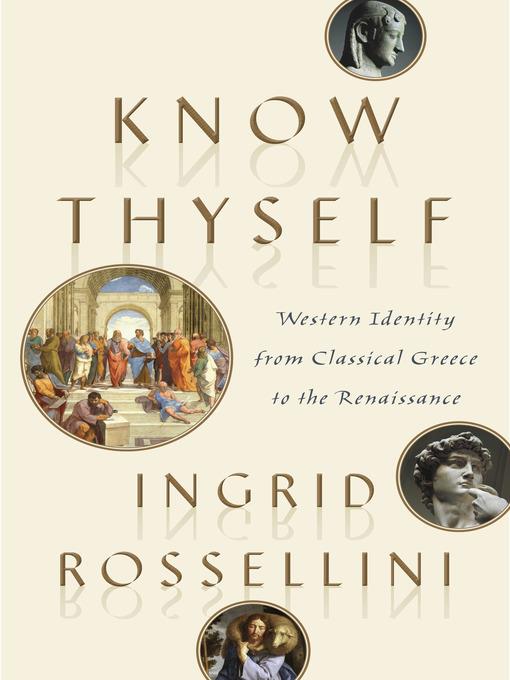
Know Thyself
Western Identity from Classical Greece to the Renaissance
- اطلاعات
- نقد و بررسی
- دیدگاه کاربران
نقد و بررسی

March 19, 2018
A scholar of Italian literature and European history tackles an ambitious project: tracing changing ideas about collective versus individual identity from 2000 BCE to the 16th century. According to Rossellini, her work is intended for lay readers, but, unfortunately, the theoretical framework—the shift from communitarian to individualistic thinking, and the implications for civil society—is so loosely constructed that it feels more like a thread lost in an enormous tapestry. Major figures share slivers of Rossellini’s expansive time line in close proximity: two Holy Roman Emperors, Charlemagne and Otto I, and one pope, John XII, share a single paragraph. The book has glimmers of wonder, as when the author conveys the essence (and putrefying flesh) of a fascinating character, a solitary ascetic: “the most extravagant anchorite of all was Simeon Stylites, who lived perched on a 60-foot-high column for 30 uninterrupted years” anchored by a rope that cut into his body. Rossellini’s epic is dazzling, disorienting, and ultimately disappointing—too often a catalogue of names, dates, and places that falls short of her stated aim of promoting a more civic-minded sensibility in a self-centric moment.

March 15, 2018
Polymath Rossellini shares the fruits of her broad knowledge of literature, philosophy, art, and history in this dense yet highly rewarding work in which readers "return to the early times of our history with the intention of rediscovering the building blocks of our contemporary personality."The author, who has taught at Columbia, Harvard, and other prestigious universities, begins with the ancient Greeks and works her way through the eras of the Romans, the Middle Ages, and the Renaissance. Collaborating with others is an innate human characteristic, and few civilizations illustrated that trait better than the Spartans and Athenians. The Spartans were isolationist while the Athenians were open and embracing of their culture. In both societies, a person's social group determined who they were and what was expected of them. The author appropriately devotes a good portion of the book to Greece and the development of philosophy, focusing on the legacies of Socrates, Plato, Aristotle, and Alexander the Great as well as the development of art, drama, and the theater and the role of mixed government. The Roman Republic carried that idea through with a perfect mix of monarchy, aristocracy, and democracy, which prevented the tyranny of the few or the many. Rossellini then moves on to the growth of Christianity, which distrusted reason and separated the mind from the soul. Suddenly the church, rather than the state, was essential to survival. Art was idolatry; doubt denied salvation, and guilt became the overriding mood. The church became a temporal leader, controlling kings and calling for the rise of the Crusades. In the Middle Ages, cities grew rapidly while infrastructure improved and universities and scholarship flourished. The author ends with humanism and the Renaissance, completing a highly satisfying journey across centuries of culture.This is no beach book. Rossellini gives us illuminating classes in art history, Western civilization, philosophy, and religion, all rolled into one book that must be read closely and pondered fully.
COPYRIGHT(2018) Kirkus Reviews, ALL RIGHTS RESERVED.

May 1, 2018
Scholar Rossellini's grand study, in many ways, presents a history of the Western soul, opening with the Homeric epics and following all the way through history to the Florentine Renaissance and the Reformation. Though covering well-treaded ground, Rossellini is skilled in teasing out the metaphysical and cultural hinges that shaped the Western mind. For instance, the author explains how the Romans, after conquering the Greeks militarily, were in turn conquered by Greek culture. Lesser-known peoples include Theodoric's Ostrogoth kingdom, which might have restored some order to post-Roman Italy had events transpired differently, especially in regards to the tragic fate of scholar Boethius. According to Rossellini, the greatest achievements of the Western intellect include the rise of humanism in Renaissance Italy, while its worst moments were the soul-wrenching Fourth Crusade and the plunder of Byzantium in 1204. Numerous photographs of art, including classical statuary, early Christian Catacomb illustrations, and Renaissance works by Giotto, Botticelli, and Michelangelo, aid the text. VERDICT A scholarly yet accessible tour through the history of Western civilization, pleasantly detailing the rises, declines, rediscoveries, and revolutions along the way.--Jeffrey Meyer, Mt. Pleasant P.L., IA
Copyright 2018 Library Journal, LLC Used with permission.

Starred review from April 15, 2018
Rumors of the death of Western civilization must be questioned when a work of popular history as absorbing and readable as this is published. While necessarily recording major political events in the successive eras she covers, Rossellini forefronts philosophy, literature, representational art, and architecture, and how those disciplines express conceptions of human nature. The idealism of classical Greece, the hierarchy and realism of imperial Rome, Christian antirationalism and feudalism in the early Middle Ages, resurgent secularism in the later Middle Ages, and the emergence of humanism and individual personality during the Renaissance, especially in Italy?these are the domains of the book's five parts. Each era made its successors possible; the achievements of Homer, Hesiod, Plato, Aristotle, Phidias, and Polyclitus; of Cicero, Virgil, the portrait bust, and monumental building; of Augustine, monasticism, and Neoplatonism; of the university, the Gothic cathedral, Giotto, and Dante; of the Italian city-state, Petrarch, Donatello, Botticelli, and Michelangelo remained inspirational to all that succeeded them. Rossellini describes those achievements with exemplary clarity and concision, provides pertinent illustrations of them (though sometimes at too small a scale), and notes the persistence of slavery and women's oppression in each period. New Western civ classes could ask for no better overview.(Reprinted with permission of Booklist, copyright 2018, American Library Association.)




دیدگاه کاربران